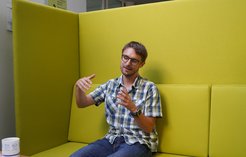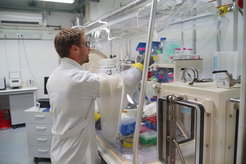Metalloenzymes in the Forge
New Emmy-Noether Research Group "Microbial Metalloenzymes"

In contrast to plants, microorganisms are capable of fixing atmospheric nitrogen, using an enzyme called nitrogenase. Johannes, why are you particularly interested in this enzyme?
During my PhD, I was able to show that nitrogenase not only fixes nitrogen, but also converts the greenhouse gas CO2 into hydrocarbons and thus produces, for example, methane, propane, butane, etc., which are energy-rich products. The question arose, whether this could be used to produce biofuels, and I was able to develop initial reactions and processes for this.
How did it happen that this property of nitrogenase, the CO2 activation, was never discovered?
First of all, this activity is very low – it`s a side reaction and the organism does not benefit from it. Nature has just not evolved nitrogenase for CO2 fixation. But what happens if we introduce a CO2 binding pocket?
What is the ultimate goal?
The long-term goal is definitely CO2 fixation and reduction. But one should not forget that we can gain quite essential insights into the inner workings of nitrogenase through this. Nitrogenase research is quite old, but surprisingly little is known about the exact course of the reaction! This is where synthetic biochemistry comes in. By creating artificial metalloenzymes, we can transfer the clusters into a new environment, a so called scaffold protein. We can isolate the metallocluster, it remains stable. Then the cluster can be put into a scaffold protein. I assume that with a foreign scaffold protein it will be possible to change the product composition and the spectrum of products.
And I think the greatest advancement in synthetic biology is a "change of mindset": that through engineering in an artificial system, you can look back and explore enzyme mechanisms and principles. I often mention biotechnological applications to explain what my research could be good for. It could take 10, 20 years to get there. But along the way we get so many insights into enzyme mechanisms. How important are amino acids? How important is the metallocluster? Does one work without the other?

Although it is a chemical topic, at first glance, you are not only looking for chemists for your new team?
Basically microbiologists, biochemists, chemists. Preferably people who come from one direction, but also have a sense for the other subjects. Whether this is a chemist making new clusters or a molecular biologist who wants to deal with protein selection or engineering - all of these are welcome. Often a combination of approaches is useful, where one step is solved biologically and another chemically.
What chances do you see for your group at the research location Marburg?
The MPI in Marburg has a long tradition in metalloenzyme research, just think of Rolf Thauer, Wolfgang Buckel or Seigo Shima for example. They have a lot of experience with metalloenzymes, which are difficult to handle, because of their oxygen-sensitivity. I am now also changing my model organism to Rhodobacter capsulatus, where I can benefit from Anke Becker's experience, and last but not least Tobi Erb's research - we have different research approaches, but they complement each other well.
And finally, young people come together here. I think this is amazing and I have the feeling that Marburg is a hotspot for junior research groups right now.That may be a coincidence, but I think it's because of the good networking here. Here is a lot going on right now.
You will certainly miss your hobby, mountaineering...
I hope I don't have to abandon this completely. Sure, it'll be less, but I'd like to do some alpine climbing and backcountry skiing. But I also find the nature here beautiful – there are lots of forests around.
Johannes, thank you very much for the interview!













